Toshiba GT40T301S IGBT Failures on PCBs
Gideon Analytical Laboratories received two Printed Circuit Boards (PCBs) with failed Insulated-gate bipolar transistors (IGBTs). The IGBTs were Toshiba GT40T301s. An insulated-gate bipolar transistor is a three-terminal power semiconductor device primarily used as an electronic switch which, as it was developed, came to combine high efficiency and fast switching. It switches electric power in many modern appliances: variable-frequency drives (VFDs), electric cars, trains, variable speed refrigerators, lamp ballasts, air-conditioners and even stereo systems with switching amplifiers. The IGBT is a semiconductor device with four alternating layers (P-N-P-N) that are controlled by a metal-oxide-semiconductor (MOS) gate structure without regenerative action. The respective IGBTs measured .4 ohms and 42.8 ohms between collector and emitter. The Ohm is the SI derived unit of electrical resistance, named after German physicist Georg Simon Ohm. The goal was to determine the cause of the failed IGBTs.
The experts at Gideon Analytical Laboratories got straight to work conducting failure analysis on the IGBTs. Electrical testing on the PCB did not reveal any leakage current. There was no external damage evident on either the PCB or the IGBT. The IGBT was disassembled. Using a microscope to examine, a black spot of carbonized epoxy was noticed. This was the reason for the failure. It illustrated a voltage “punch through”, which occurs as a result of too much voltage. Voltage is the difference in electric potential energy between two points per unit electric charge. The voltage between two points is equal to the work done per unit of a charge against a static electric field to move the test charge between two points. Overvoltage is a bad thing that can lead to failures. Both of the IGBTs indicated that the BVces was exceeded.
Another day, another problem solved. It is an everyday occurrence at Gideon Analytical Laboratories. To your electronics company, failures are like chlorides on components: you don’t want them. What can you do? Get rid of them altogether. Whether the problem is in design, manufacture, or application, Gideon Analytical Laboratories is here to help. Let us assuage your fears and calm your nerves. You have the problems, and we have the solutions. Let us help you today.
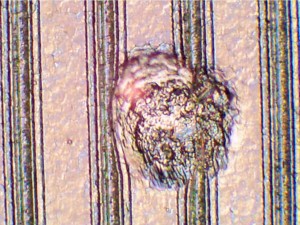
Damage from overvoltage
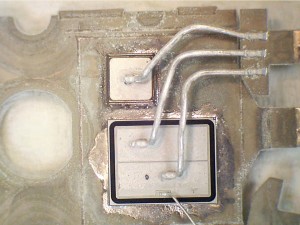
IGBT with fast recovery diode
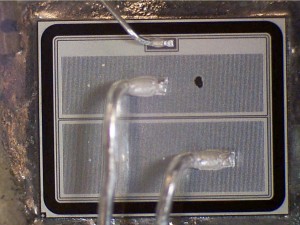
Carbonized epoxy in the middle
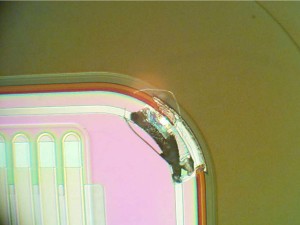
Silicon cracked on surface, the result of overvoltage
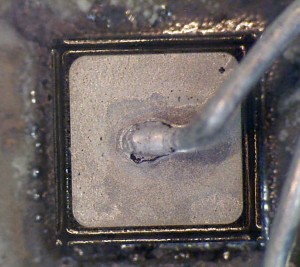
IGBT has no electrical issues

Voltage punch through